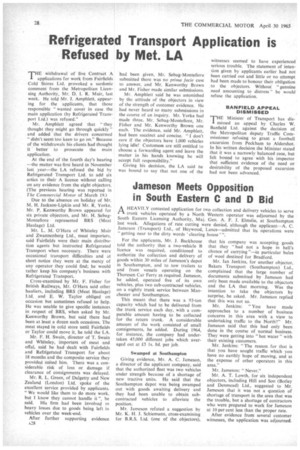Refrigerated Transport Application is Refused by Met. LA
Page 30

If you've noticed an error in this article please click here to report it so we can fix it.
THE withdrawal of five Contract A applications for work from Fairfields Cold Stores Ltd. provoked a sardonic comment from the Metropolitan Licensing Authority, Mr. D. I. R. Muir, last week. He told Mr. J. Amphlett, appearing for the applicants, that those responsible wanted cover in case the main application (by Refrigerated Transport Ltd.) was refused."
Mr. Amphlett agreed that "they thought they might go through quickly" and added that the drivers concerned "didn't seem too keen to go on." Because of the withdrawals his clients had thought it better to prosecute the main application.
At the end of the fourth day's hearing —the matter was first heard in November last year—the LA refused the bid by Refrigerated Transport Ltd. to add six artics to their A licence without calling on any evidence from the eight objectors. (The previous hearing was reported in The Commercial Motor of March 19.) Due to the absence on holiday of Mr. M. H. Jackson-Lipkin and Mr. R. Yorke, Mr. P. Kenworthy Brown appeared for six private objectors, and Mr. H. SebagMontefiore represented BRS (Meat Haulage) Ltd.
Mr. L. M. O'Hara of Whiteley Muir and Zwannenberg Ltd., meat importers, said Fairfields were their main distribution agents but instructed Refrigerated Transport when necessary. There were occasional transport difficulties and at short notice they were at the mercy of any operator they could find; he would rather keep his company's business with Refrigerated Transport.
Cross-examined by Mr. F. Fisher for British Railways, Mr. O'Hara said other hauliers, including BRS (Meat Haulage) Ltd. and E. W. Taylor obliged on occasion but sometimes refused to help. He was unable to give specific instances in respect of BRS, when asked by Mr. Kenworthy Brown, but said there had been at least a dozen such occasions. The meat stayed in cold store until Fairfields or Taylor could move it, he told the LA.
Mr. F. H. Swain, director of T. Swain and Whiteley, importers of meat and offal, said he had dealt with Fairfields and Refrigerated Transport for about 18 months and the composite service they provided suited him. There was a considerable risk of loss or damage if clearance of consignments was delayed.
Mr. R. L. Green, of Dalgetty and New Zealand (London) Ltd. spoke of the excellent service provided by applicants. "We would like them to do more work, but 1 know they cannot handle it ", he said. His firm had been involved in heavy losses due to goods being left in vehicles over the week-end.
After further supporting evidence A28 had been given, Mr. Sebag-Montefiore submitted there was no prima facie case to answer. and Mr. Kenworthy Brown and Mr. Fisher made similar submissions.
Mr. Amphlett said he was astonished by the attitude of the objectors in view of the strength of customer evidence. He had never heard so many submissions in the course of an inquiry. Mr. Yorke had made three, Mr. Sebag-Montefiore, Mr. Fisher and Mr. Kenworthy Brown one each. The evidence, said Mr. Amphlett. had been succinct and concise. "I don't care if the objectors have 1,000 vehicles lying idle! Customen are still entitled to choose a forwarding agent and leave the matter in his bands knowing he will accept full responsibility."
Giving his decision, the LA said he was bound to say that not one of the
witnesses seemed to have experienced serious trouble. The statement of intention given by applicants earlier had not been carried out and little or no attempt had been made to honour their obligation to the objectors. Without "genuine need amounting to distress" he would refuse the application.
BANFIELD APPEAL DISMISSED
THE Minister of Transport has dis
missed an appeal by Charles W. &infield Ltd. against the decision of the Metropolitan deputy Traffic Commissioner refusing to grant a football excursion from Peckham to Aldershot. In his written decision the Minister stated that it was a narrowly balanced case, but felt bound to agree with his inspector that sufficient evidence of the need or desirability of the proposed excursion had not been advanced.




































































































